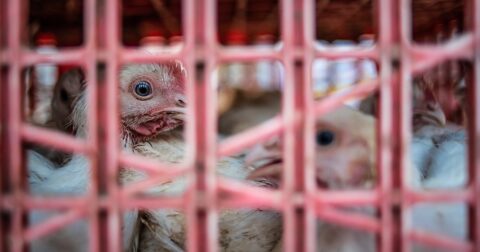News
A Major Agreement to Protect the Amazon Is Falling Apart After 20 Years
Climate•6 min read
Reported
A former UK police detective says abuse is tied to violent crimes like child abuse and sexual assault. Still, law enforcement agencies rarely prioritize animal protection.


Words by Sophie Kevany
The European Union has a much-discussed problem: its inability to properly enforce animal protection laws. Less discussed is the possibility that lax animal law enforcement means opportunities to fight human crimes are missed.
Mark Randell, a former UK police detective, believes that until crimes against animals are seen as an indicator of community malfunction and future violence towards other humans, opportunities to catch criminals will be squandered. That belief led him to found Hidden-In-Sight, a training program that helps law enforcement, NGOs, and other agencies understand the advantages of prioritizing animal crime.
“We know when you tackle animal abuse you get less rapes, less drug abuse,” Randell told Sentient Media, citing a range of studies and his own experience. “Take animal sexual violence. It is inextricably linked to child sexual abuse,” he said. That means if law enforcement agencies commit resources to actively fighting animal abuse, he says, they will almost certainly find more sexual predators.
Combating domestic abuse is another area that benefits from focusing on animal mistreatment, he said, mainly because abusers are known to use pets to exert coercive control over partners. Coercive control is a term used to describe the emotional and psychological ways one person attempts to control or manipulate another. In Scotland, a recent domestic violence bill includes farmed animals as a coercive control risk.
Dogfighting rings are another example. “We can find more drugs with dogfighting warrants than we do with drug warrants,” he said, adding that a recent UK study found that “many gangsters and drug dealers have become involved in dog-fighting, not least because they can afford the bets.”
But instead of seeing animal mistreatment as a crime-fighting opportunity, Randell suggests police often treat it as a secondary issue. “In police terms, domestic violence and drugs are the priority,” he said. That view, he says, is compounded by a feeling that animal abuse is somehow beyond police remit, seen rather as the province of NGOs and activists.
And when police do go out of their way to protect animals, they are often penalized for it. In Spain, two police officers are currently fighting reassignment to court duties following more than 40 animal rescues. Randell said he was not surprised by the case. He believes the officers, who see their court reassignments as a punishment, are likely victims of the view that those enforcing animal law are neglecting more serious issues.
Randell’s words mirror the comments made by an unnamed police source to Spanish newspaper El Pais about the work of the police officers, Flor Peña and Alberto Venera. The source claimed that the officers, who won commendations and an award for their animal work in the town of Alcalá de Henares, just east of Madrid, were “neglecting other duties.”
Peña and Venera, who remain assigned to court duties where they have no contact with the community or animals, are currently preparing a workplace harassment lawsuit, which they hope will be heard this year.
Higher up the enforcement chain, animal rights lawyers see the same problem, saying that despite the EU’s relatively high reputation for animal welfare, animal law is often seen as a lower priority. Some believe this is an active rather than a passive problem.
“Often I have the impression that, unfortunately, animal welfare is treated in a secondary way by European institutions and national governments compared to other issues such as competition or economic interests,” said Manuela Giacomini, a Genoa-based lawyer who works with animal NGOs.
Alice DiConcetto, lawyer and founder of the European Institute for Animal Law & Policy agrees, pointing to the fact that while EU members “notoriously ignore” certain rulings – notably approving animal transports “they know will not comply with EU rules once they leave the EU territory” – the EU has failed to issue “even one infringement procedure” against the rule-breaking.
By the EU’s own admission, most recently in November 2021 recommendations from a special EU committee on animal transport, its nations are doing a poor job of enforcing animal protection laws. In one of several examples, the recommendations call on the EU Commission to “exercise stronger enforcement powers, namely when faced with recurrent and repeated violations of the regulation.”
One potential solution, says Antoine F. Goetschel, lawyer and founder of the Global Animal Law GAL Association, is to appoint a public animal defender to represent the animal’s interests in every criminal procedure. Because current systems “do not see the animal as a victim in an appropriate way,” Goetschel told Sentient Media, the change would mean animals had “their own legal voice in criminal procedures.”
The move, he says, would be particularly important because the welfare of animals is “in opposition to economic interests,” a situation that “makes it difficult for their voices to be heard.”
The European Commission did not respond to emails highlighting failures to enforce animal protection laws.